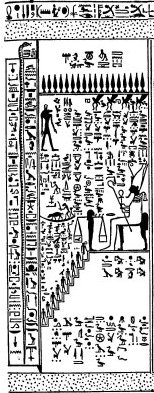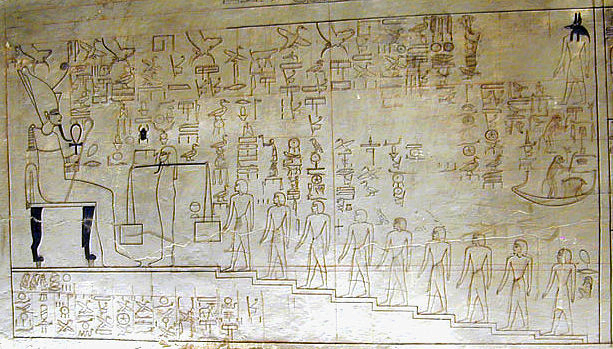In the top register, there are twelve gods bowing in adoration who are named as “those who make adorations in the Duat”. They are followed by twelve gods holding a surveying cord to allot both space (in the form of a field or estate) and time (represented by the serpent and the shen in the bottom register). They are named “Holders of the cord in the Duat”. Finally, there are four “henbi” gods (overseers), each holding the symbol of life in his right hand and a sceptre in the left. The text says;

“(These are) they who make songs to Ra in Amentet and exalt Heru-khuti. (These are they who) knew Ra upon earth, and who made offerings to him. Their offerings are in their place, and their glory is in the holy place of Ament. They say to Ra ‘Come, Ra, progress through the Duat. Praise be to you! Enter among the holy (places) with the serpent Mehen’. Ra says to them “There are offerings for you, O you who made offerings. I am content with what you did for me, both when I used to shine in the eastern part of heaven, and when I was sinking to rest in the chamber of my Eye”. Their food is of the bread-cakes of Ra, and their drink is of tcheser drink, and their libations are made of cool water, and offerings are made to them on the earth in (return) for the praisings which they make unto Ra in Ament.”
“(These are they who) hold the measuring cord in Ament, and they go over the fields of the Khu (blessed spirits). (Ra says to them) ‘Take the cord, draw it tight, and mark out the limit of the fields of Amentet, the Khu whereof are in your abodes, and the gods whereof are on your thrones.’ The Khu of Neterti are in the Field of Peace, (and) each Khu hath been judged by him that is in the cord. Righteousness is to those who are (who exist), and unrighteousness to those who are not. Ra says to them ‘What is right is the cord in Ament, and Ra is content with the stretching of it. Your possessions are yours, O gods, your homesteads are yours, O Khu. Behold, Ra makes (works) your fields, and he commands on your behalf that there may be sand (earth?) with you. Hail, journey on, O Khuti, for verily the gods are content with that which they possess, and the Khu are content with their estates. Their food (comes) from Sekhet-Aru, and their offerings from that which springs up there. Offerings are made to them upon earth from the estate of Sekhet-Aru’.”
“To the four bearded gods Ra says “Holy are you, O Henbi gods, overseers of the cords in Amentet. Establish fields and give (them) to the gods and to the Khu (after) they have been measured in Sekhet-Aaru. Let them give fields and sand (earth?) to the gods and to the souls who are in the Duat.” Their food shall be from Sekhet-Aaru, and their offerings from the things which spring forth therein.”
The boat of Ra is in the middle register. With Ra (as ever) are the gods Heka and Sia. In front of the four gods towing the sun barque stand twelve shrouded gods holding the coils of a huge snake. They are named as “those who hold Ennutchi” (Apep). In front of these gods stand twelve gods named “the souls of the men who are in the Duat”. They are followed by Hetepi the god who is “over his corner” (or “of his angle”). The text reads;
“The gods of the Duat draw along this great god, and he journeys through the hidden place. (Ra says) ‘Draw me along, O gods of the Duat, and sing praises to me, O you who are at the head of the stars; let your cords be strong, and draw me along by means of them, and let your hands and arms be steady, let there be speed in your legs, let there be strong intent in our souls, and let your hearts be glad. Open a prosperous way into the chambers of hidden things.'”
“Those who are in this scene carry this serpent. Ra strikes them and advanceth towards them to rest in (the gateway called) Nebt-Ahau. This serpent travels as far as it (the gateway), but he does not pass beyond it. Ra says to them “Strike the serpent Ennutchi there, give him no way (to escape), so that I may pass by you. Hide your arms, destroy that which you guard, protect that which comes into being from my forms, and tie up that which comes into being from my strength.” Their food consists of the hearing of the word of this god, and offerings are made to them from the hearing of the word of Ra in the Duat.”
“To those who have spoken what is right and true upon earth, and who have magnified the forms of the god, Ra says ‘Praises shall be (sung) to your souls, and there shall be breath to your nostrils, and there shall be to you joints in Sekhet-Aru. That which shall be indeed yours is what belongeth to the Ma´ati Gods. The habitations which shall be yours shall be at the corner where (live) those who are with me who weigh words for them’. Their food is of bread-cakes, and their drink of tchesert drink, and their libations are of cool water. Offerings are made unto them upon earth as to the god Hetepi, according to what should be offered unto them. Ra says to this god ‘Let him that is over his Corner (Heri-Qenbet-f) cry out to those souls who are right, and true, and divine, and make them to sit at peace in their habitations at the Corner of those who are with me’.”

In the bottom register Horus leans upon a staff watching over four groups of four men representing the four races of mankind; Reth (Egyptians), Aamu (asiatic peoples from the deserts to the east and north-east of Egypt), Nehesu (Nubians and other african races), and Themehu (fair-skinned Libyans). Sekhmet is mentioned in text connected with this section but does not appear in the images. In front of them, twelve bearded gods hold the body of a long serpent who represents time. They are called the “Holders of the period of time in Ament”. In front of them are a further eight bearded gods named as the “Sovereign chiefs of the Duat”. The text reads;
“Horus says to the creatures of Ra who dwell in the Black Land (Kemet, Egypt) and in the Red Land (the deserts which lie on each side of the Black Land) ‘Magical protection be over you, O creatures of Ra, who have come into being from the Great One who is at the head of heaven. Let there be breath to your nostrils, and let your linen wrappings be loosened. You are the tears of the eye of my splendour in your name of Reth. Mighty of issue you have come into being in your name of Aamu; Sekhmet has created them, and it is she who delivers (avenges) their souls. I masturbated (to produce you), and I was content with the hundreds of thousands (of beings) who came forth from me in your name of Nehesu; Horus made them to come into being, and it is he who avengeth their souls. I sought out mine Eye, and you came into being in your name of Themenu; Sekhmet has created them, and she avenges their souls.”
Those who make firm (permanent) the duration of life stablish the days of the souls (in) Amenti and possess the word (command) of the place of destruction. Ra says to them “In as much as you are the gods who dwell in the Duat, and who have possession of Meterui (the serpent), by means of whom you mete out the duration of life of the souls who are in Amenti who are condemned to destruction. Destroy the souls of the enemies according to the place of destruction which you are commanded to appoint, and do not let them see the hidden place.”
(Here are) the divine sovereign chiefs who shall destroy the enemies. They shall have their offerings by means of the word (which becomes Maat; they shall have their offerings upon earth by means of the word (which becomes) Ma´at, and it is they who destroy and who pass the judgement concerning (literally “those who write”) the duration of the life of the souls who dwell in Amenti. The destruction which is yours shall be (directed) against the enemies, and the power to write (judge) which you possess shall be for the place of destruction. “I have come, even I the great one Horus, that I may make a reckoning with my body, and that I may shoot forth evils against my enemies.” Their food is bread, and their drink is the tchesert wine, and they have cool water wherewith to refresh (or, bathe) themselves. Offerings are made to them on earth. One does not enter into the place of destruction.
At the right hand side of the scene stands the fifth gate of the Duat (named Nebt-Aha). The gateway is guarded by twelve bearded mummy forms, who are described as the “gods and goddesses who are in this pylon”. The entrance to the corridor is guarded by Maa-ib (“true of heart”) and at the exit by Sheta-ib (“sectret of heart”).
Hall of Judgement

Between the gate at the end of hour five and the serpent Set-em-Maat-f before the entrance to the sixth hour lies the Hall of Judgement (or the Hall of Maat). The roof of the hall is decorated with spear heads and four gazelle or ox heads (known as the Hahaiu) hang from it. Osiris wearing the double crown sits at the top of nine steps each with a god standing on it. In front of him are the scales. Unlike the Hall of Judgement in the Book of the Dead, the scales are sometimes empty. In the version from the tomb of Seti there is a small bird in one pan of the scales, representing evil. In front of the scales there is boat containing a pig called “Am-a” (“the eater of the arm”) and a dog-faced ape holding a stick. In the top left we can see Anubis. The text reads;
(of Osiris) “His enemies are under his feet, the gods and the spirits are before him; he is the enemy of the dead (the damned) among the beings of the Duat, Osiris puts (his) enemies under restraint, he destroys them, and he performes the slaughter of them.”

(of Anubis) “Hail, you who make to be Maat the word of your little one, may Thoth weigh the words, may he make to eat his father.”
(by the boat) “(When) this god enters, he (the Ape) rises and restrains Am-a.”
(behind the scales) “The bearer of the hatchet and the bearer of the scales protect the inhabitant of Amenti, (who) rest in the underworld, and traverse the darkness and the shadows. Happiness is above, and justice below. The god rests and sheds light produced by truth which he has produced.”
The judgement of the dead takes place immediately before the union of the ba with the body of the sun god, which takes place in the sixth hour.
Bibliography
- Hornung, Erik (1999) The Ancient Egyptian Books of the Afterlife
- Wallis Budge, E.A. (1905) The Book of Gates
Copyright J Hill 2018